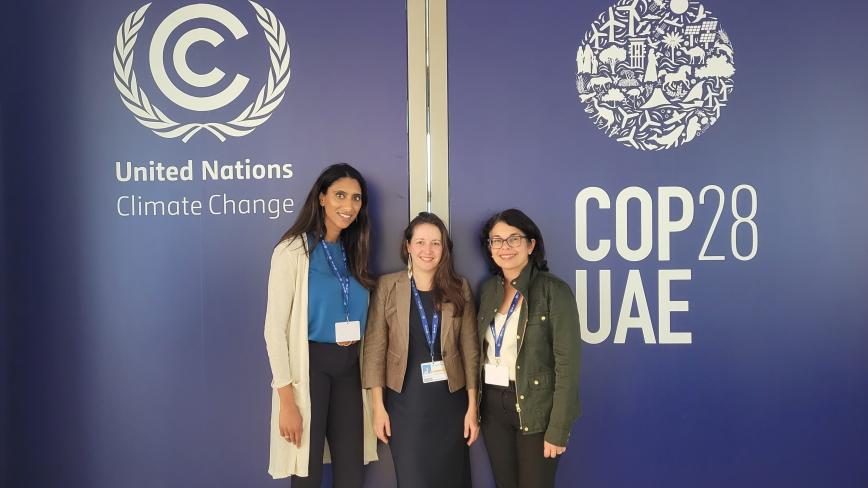A team from the University of California Center for Climate, Health and Equity (CCHE) attended week 1 of the 28th UN Climate Change Conference (COP28) as observers representing UC and health communities. The United Arab Emirates (UAE) is hosting the conference, which launched on November 30 in Dubai and will run until December 12. This will be the first time that health considerations are incorporated into the formal agenda. Also at the conference, countries will take stock of whether we are on track to limit global warming to 1.5 degrees Celsius. Following are a series of perspectives from their time in Dubai, written by CCHE's Founding Co-Director Arianne Teherani, Ph.D, Managing Director Sapna Thottathil, Ph.D., and Associate Director of Strategy and Communications Jennifer Monroe Zakaras, MPH.

We are negotiating lives: health takes center stage at COP28
By Jennifer Monroe Zakaras, MPH, Arianne Teherani, Ph.D, and Sapna Thottathil, Ph.D.
We were on the ground in Dubai as part of the University of California delegation and to support health community representation at this historic event. This year, health was taken from the sidelines and recognized as an essential consideration of climate decisions. Dr. Tedros Adhanom Ghebreyesus, Director-General of the World Health Organization, reminded us in his COP28 remarks that, "Undoubtedly, health stands as the most compelling reason for taking climate action.”
It remains to be seen, however, what this watershed moment for health means for climate action and results. In the words of Brazil’s Minister of Health, the Honorable Nísia Trindade: this is not a single day, but a process. The inclusion of health ministers alongside environment and climate delegations signals a historic shift from prior COPs, and we need to ensure that health remains permanently central to COPs moving forward. We also need to continue activating the health community to be climate champions and to push the public health imperative of ambitious climate action.
Taking steps toward climate and health action
There were promising actions related to health during the first week of the gathering. On December 2, we saw the unveiling of $1 billion in new funding for climate and health, comprised of commitments from the Rockefeller Foundation, The Global Fund to Fight AIDS, Tuberculosis and Malaria, and others. On December 3, we celebrated the convening of the first-ever Climate-Health Ministerial, with over 100 countries participating. As of now, 127 countries have signed onto the COP28 Declaration on Climate and Health, which is a voluntary and non-binding commitment that reflects countries’ concerns with and aspirations to safeguard health in the face of climate change.
Fossil fuels and the climate-health crisis
Despite these steps forward, the biggest elephant in the COP28 room remains: solving the climate-health crisis and ensuring a just transition will be impossible without a full phase out of fossil fuel use. Language to this effect was notably absent from the climate-health declaration, despite an open letter to the COP28 president from 46 million healthcare workers demanding an end to fossil fuels. And while over 80 countries, including the United Sstates, support language that calls for the end of fossil fuels, Saudi Arabia, China, and Russia are opposed, undercutting the unanimous consensus required by the United Nations Framework Convention for Climate Change.
Many have raised concerns that a strong fossil fuel statement will be challenged by an oil-producing country hosting the conference (the UAE). Already evident are the conflicts of interest that can arise from an oil executive facilitating global climate negotiations. The participation of oil lobbyists is also reported to be at an all-time high at COP28. While many have echoed calls for 1.5C to be the world’s “north star”, including even the COP28 President, meeting this target via a phaseout or phasedown of fossil fuels lies at the heart of the debate in Dubai.
UNFCCC Secretary Simon Stiell said in his COP28 opening remarks: “If we do not signal the terminal decline of the fossil fuel era as we know it, we welcome our own terminal decline. And we choose to pay with people’s lives… It’s simply not good enough for us be ‘trying to try.’” We are eager to see in the week ahead if COP28 delegates head this call to accelerate climate action, as supported by science, and as our health and wellbeing demand.
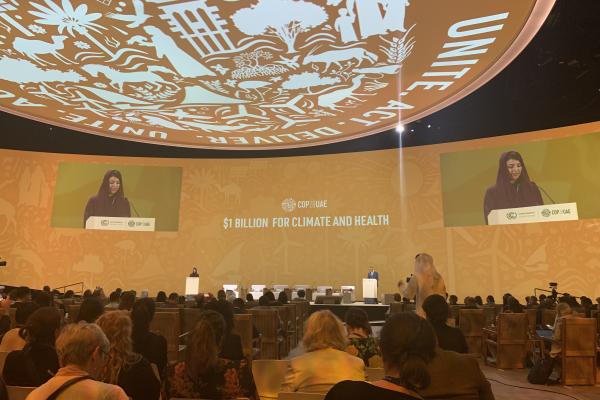
Working together to drive change
By Arianne Teherani, Ph.D., Sapna Thottathil, Ph.D, Jennifer Monroe Zakaras, MPH
COP28 is the biggest COP yet – with 103,000 participants registered – presenting an incredible opportunity for impact. COP28 also brought with it many firsts, primarily for health: A political declaration on climate change and health signed by over 120 countries, a first-time ministerial on climate change and health with over 70 ministers and delegates from 100+ countries, and $1 billion in new funding initiative for climate change and health.
With so many attendees representing various sectors, official side events are sanctioned by the United Nations to support dialogue and networking on climate change issues. The third day of COP28 brought the opportunity for us at the University of California (UC) Center for Climate, Health and Equity (CCHE) to co-host a side event with the University of Arizona and international academic partners from the Muhimbili University of Health and Allied Sciences in Tanzania, the University of Basilicata and the Euro-Mediterranean Center of Climate Change in Italy, and the Observer Research Foundation in India. This event celebrated the vital role of the academic sector in accelerating the evidence and education we need for ambitious action on climate change, health and justice.
In that moment, we felt immense pride in our UC community - an academic powerhouse producing groundbreaking research on mental health and climate, community-centric climate action, climate disasters and refugee health, and more. Moreover, UC actively nurtures leaders working at the climate-health nexus through its student training and mentorship. 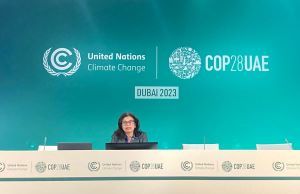
At the side event, our panelists discussed the role of academic centers in accelerating the important evidence needed to influence health policy and practice during the climate crisis, how to promote sustainable development in addressing water and health infrastructure for adaptation and resilience, the need to harness new research approaches with artificial intelligence, and the link between climate change and health action for global governance.
The academic sector with it forward-thinking, novel research questions and methods, is ready to play a vital and timely role in informing lessons learned, what comes next.
NDCs, a critical area for the future research
As decisions continue to be made at COP28, we at the CCHE see several critical areas for future research toward the goal on mitigation and adaptation, in particular in the nationally determined contributions (NDCs). Significant progress has been made in integrating health into NDCs which are the self-defined national climate pledges under the Paris Agreement and one of the primary instruments focused on emissions reduction. While 91% of the available NDCs now include health considerations, the research community will need to contribute to thinking about ways to measure for health outcomes described in the NDCs, assess health co-benefits to inform policy, and study success cases for how health should be integrated across all sectors such as food, water, and societal governance.
COP28 also marked the historic commitment of $700 million by wealthy countries to the Loss and Damage Fund to support economic and non-economic losses to developing countries caused by climate change. The NDCs account for Loss and Damage to health and wellbeing, and we now need a thorough, equitable, and inclusive understanding of health vulnerabilities, capacities, and responses to inform the response and recovery from loss and damage.
As Margaret Mead reminds us: “Never doubt that a small group of thoughtful, committed citizens can change the world; indeed, it's the only thing that ever has.” Researchers are one of those committed citizen groups who produce the bedrock evidence guiding an informed, strategic global response across public, private, and civil spheres. Our work at the University of California and institutions throughout the world, paves the road to a just, equitable, and healthy planetary future.
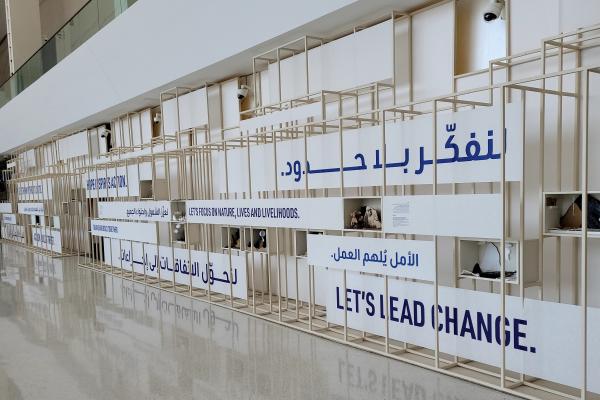
Hope for climate action: looking beyond nation-state commitments
By Sapna Thottathil, Jennifer Monroe Zakaras, Arianne Teherani
A new report shows that global emissions are going in the wrong direction and rose between 2022 and 2023. But at the halfway point of this year’s international climate change conference (COP28), global leaders continue to remain divided about how different countries should take action on climate change.
COP28 thus far has been dominated by debates about whether and how much progress we’ve made on reaching Paris Agreement climate goals, who is responsible for financing solutions, and whether the financing solutions promised in prior meetings (for loss and damage and renewable energy transitions, among others) have come through, let alone equitably. Financing for health-related solutions remains terribly small, despite this year’s first-ever health day and the unprecedented attention to health-related issues at COP28.
It's easy to feel despair, especially as these conversations are playing out against the backdrop of COP28 being hosted by the United Arab Emirates (UAE), the world’s leading oil producer and an outsized contributor to emissions. Meanwhile, temperatures are growing hotter, and the toll on human health is rising. According to the World Meteorological Association, the past eight years have been the hottest on record.
California leading the way
While international negotiations may be limping along, we heard promising commitments and news from others at COP28. The state of California, for example, announced its leadership in cutting and monitoring methane, a greenhouse gas that is more potent that carbon dioxide. Members of the Race to Zero campaign, which represents 11,309 non-state actors (including 1,125 educational and 65 healthcare institutions) that have committed to achieving net zero carbon emissions by 2050, also announced new commitments and progress at COP.
We shared that the University of California (a member of Race to Zero) is building the nation’s first all-electric hospital at UC Irvine (scheduled to open in 2025), has 100 renewable energy projects throughout our entire system, and has implemented over 1,100 energy efficiency projects, resulting in cumulative avoided utility costs of more than $300 million. We anticipate that more local, place-based announcements of commitments, solutions, and achievements will continue throughout the rest of COP28.
The power of grassroots action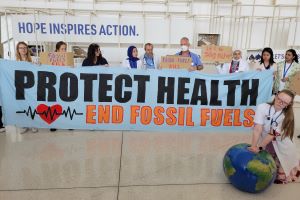
Here's where non-state actors – institutions, local governments and cities, and individuals – are vital for climate action and ensuring the world can get back on track to meet its target to limit global warming to 1.5°C compared to pre-industrial levels by 2030. To be sure, significantly more action – from the rapid phasing out of fossil fuels to the equitable financing of renewable energy at international and national levels – is needed to make sure we don’t reach catastrophic levels of climate change, and this action is needed immediately. As John Kerry, the U.S. Climate Envoy, said at a press conference at the conclusion of week 1 of COP28: “this is crunch time.”
We left COP28 and returned to the United States hopeful about the exemplary climate action from the regional, local, and grassroots levels. We are hopeful about how the climate movement is growing to include clinicians, hospitals, and even the U.S. Department of Health and Human Services. And we are hopeful that these latest developments will continue to build momentum that shows that that the phasing out fossil fuels is not only possible and supported by a diverse group, but consistent with equitable, resilient, and healthy development for all communities.

